The Beatles documentary: Inside Apple Corps with the staff who worked there
The story of the early years of the band's business venture Apple Corps is told in Ben Lewis’s entertaining and revealing new film 'The Beatles, Hippies And Hell’s Angels'
Geoffrey Macnab
Jun 13 2017

Paul McCartney in the Press Office at Apple Corps
Tom Hanley
It was when the hungry and belligerent Hell’s Angel Pete Knell threatened to smash his fist into John Lennon’s face at the office Christmas Party that it finally became apparent that the beautiful dream of Apple Corps wasn’t sustainable. Knell had already knocked out one of the other partygoers, a well-spoken English “twit” who had tried to tell him it wasn’t “cool” to be hungry. Actor and author Peter Coyote, a close friend of Knell’s, intervened, telling Lennon (who was dressed as Santa Claus) to sit down before the Hell’s Angel could strike again. This incident took place in the Georgian building in Savile Row, Mayfair, that served as Apple Corps’s offices.
Apple Corps was the venture set up by the Beatles in 1968. It was somewhere between a conventional entertainment business and a hippy Nirvana. The story of the early years of the company is told in Ben Lewis’s entertaining and surprising new film, The Beatles, Hippies And Hell’s Angels. This is a Beatles documentary with a difference. There are no screaming teenagers or scenes of John, Paul, Ringo, George singing "Love Me Do".
Coyote (the former hippy turned star of such movies as E.T. andBitter Moon) is an interviewee. After all, he was there as part of the posse of Californian Hell’s Angels and counter-culture figures invited to Apple’s London HQ by George Harrison for reasons that are still a little obscure. With his wonderfully gravelly voice, Coyote is also the narrator of the film.
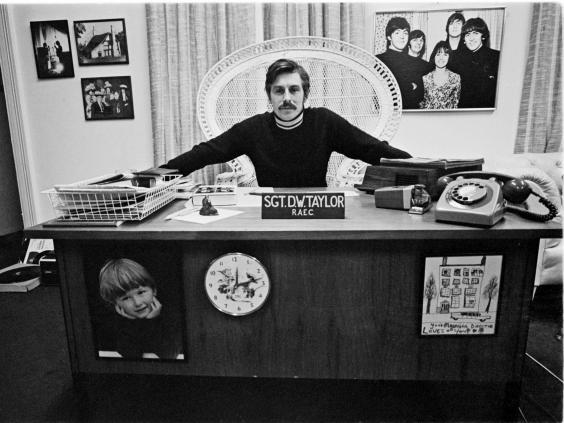
Derek Taylor, the Beatles' press office at Apple Corps, the venture set up by the Beatles in 1968 (Tom Hanley )
This isn’t an official documentary. Paul McCartney and Ringo Starr, the remaining living Beatles, aren’t involved. Lewis, though, has tracked down the secretaries, journalists, DJs, sound engineers, musicians, accountants, hairdressers and free-loaders who lived, worked and hung out at Apple Corps. He tells a story at once comical and very sad. If you want to know why the Beatles split up, you will find out here.
This is one of the few rock docs in which the accountant’s voice features as strongly as that of his music biz clients. As Steven Maltz, the account at Apple, explains on camera, he had been going through the group’s papers in 1966 and was shocked to discover “nothing had been done.” The Beatles hadn’t filled in their tax returns. They were then probably the most successful band in the world and yet they were teetering on the brink of bankruptcy. Maltz told the musicians that they should start businesses and invest in them to save themselves from having to give all their money to the taxman.
Apple Corps was an exercise in capitalism but one launched in a very hippy fashion. The new venture involved music, films, fashion and electronics. The aim was to use music to change the world. “All the profits won’t go into our pockets. They’ll go to help people, but not like a charity,” McCartney explained the enterprise in a 1968 interview. Given this approach, it was little wonder that Apple Corps was soon haemorrhaging money as the Fab Four invested in some of the most unlikely new businesses and were fleeced by a variety of chancers. The irony is that the story the documentary tells is almost identical to that of the Eric Idle/Neil Innes Beatles spoof, The Rutles - All You Need Is Cash (1978).
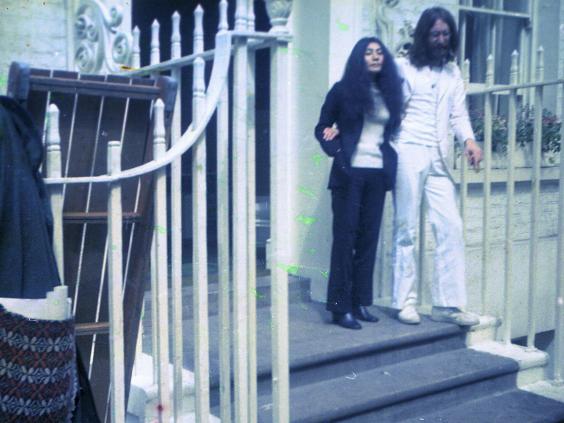
John Lennon and Yoko Ono on the steps of Apple Corps at 3 Saville Row in 1969
One of Apple’s first steps was to shoot The Magical Mystery Tour in the West Country. This was goonish psychedelia - the Beatles’ very own, very British answer to the drug-fuelled trip across America by Ken Kesey and the Merry Pranksters in a school bus a couple off years before. The Magical Mystery Tour was received with incomprehension when it was broadcast on the BBC. It didn’t help that it went out in black and white given that had made in mind-bending psychedelic colour.
Apple Music began signing up artists, among them James Taylor, Badfinger and Mary Hopkins (who had been recommended by model, Twiggy.) For every success, though, there were many idiosyncratic failures. One of the oddest was the company’s excursion into big brass band music with the Black Dyke Mills Band.
Another of Apple’s projects was spreading Krishna consciousness and transcendental mediation.
The staff working at Apple Corps enjoyed themselves. A typical day for the secretaries might start with a sherry and a cigarette. This would be followed by a long lunch. “You never quite knew who was going to be coming into the office,” one former secretary recalls.
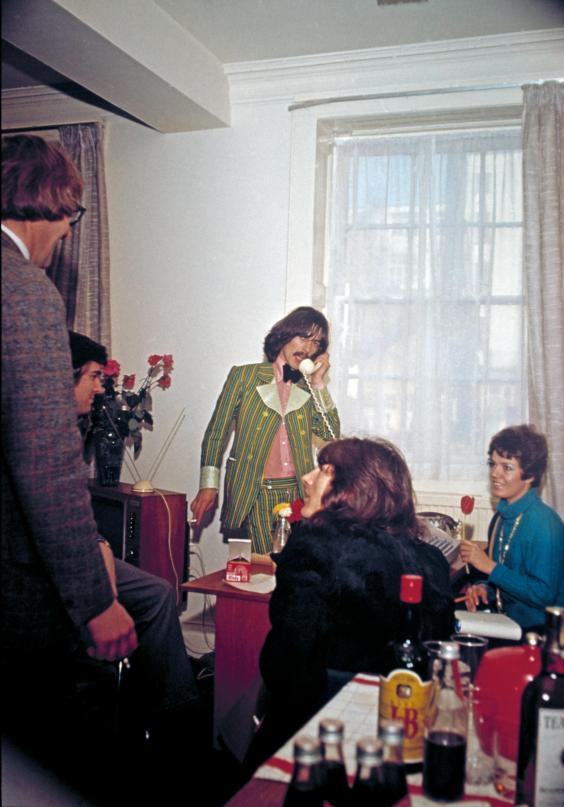
George Harrison at Apple Corps - arguments over the business venture led to the band splitting up (Tom Hanley )
Visitors like journalist Ray Connolly might drop by for a drink. It wasn’t unusual for strange gifts to be delivered (among them, once, a donkey.)
Apple Corps had opened its own fashion boutique. The company invested heavily in new technology, especially electronics, under their hippy boffin “Magic Alex” (Yanni Alexis Mardas.)
“I thought it was a story that was almost Chaucerian in a way. It was a yarn about something which was quite trivial involving really famous people. It revealed them to be really, really human. I liked all the contradictions. On the one hand, you thought that the Beatles were being really silly and self-indulgent because they had lost of money. On the other, you really identified with them,” Lewis (director of such other docs as Google And The World’s Brain and The Great Contemporary Art Bubble) reflects on the Apple Corps story. “The Beatles were pretty nice people, clever people, sane people. Given the level of fame John, Paul, Ringo and George had gone through, they had emerged relatively unscathed.”
It was only to be expected that the Beatles would be a little naive about business. For many years, they had been in a bubble. They’d been touring and recording - and having very limited exposure to the everyday world. Now, they wanted to run a business and live by hippy values but money kept on getting in the way.
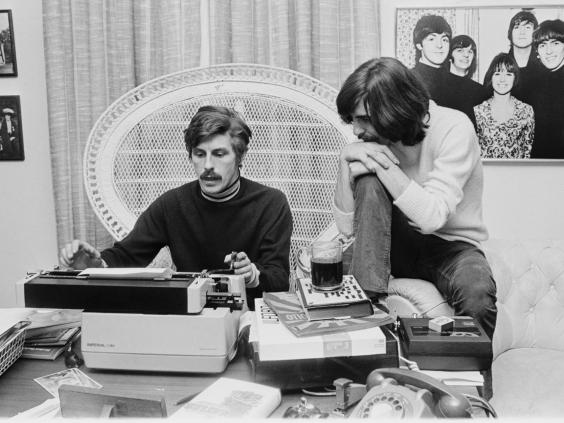
The Beatles' press officer Derek Taylor with Ringo Starr at Apple Corps (Tom Hanley)
The latter part of the documentary looks at the power struggle that eventually tore the band apart. The Beatles realised they needed a strong and savvy figure to sort out the mess that was Apple Corps. McCartney favoured his father in law, New York attorney Lee Eastman. John Lennon and the others were keener on Allen Klein, the famously abrasive business manager of the Rolling Stones. In meetings about the future of the company, Klein is said to have called Eastman a “shithead” and to have dismissed his offer to the Beatles as “a piece of crap.” Eastman responded by telling Klein he was “a perfect asshole.”
Lennon persuaded Starr and Harrison to go with Klein. McCartney couldn’t accept the idea that Klein was running Apple. This, as much as bad feeling about Yoko Ono or Linda, was what was to stop the Beatles recording and, eventually, to lead to the break-up of the band.
“It was only after Allen Klein destroyed the utopian, hippy concept of Apple that the Beatles actually split. Paul threw in the towel,” Lewis notes.
In hindsight, Apple Corps seems ahead of its time. It combined technology, music, film and fashion. This could have been a great business…if only it had been run a little more efficiently.
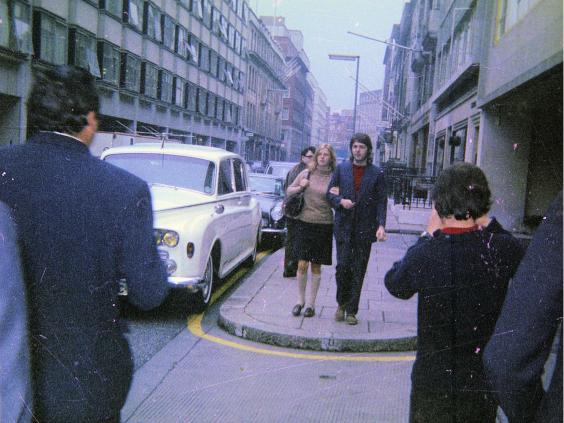
Paul and Linda McCartney outside Apple Corps in 1969 as part of unseen amateur photos taken by ‘Apple Scruffs’
Lewis insists that his film is not intended to be “irreverent or disrespectful.” Instead, he is trying to tell the story of Apple Corps in an “honest and truthful way.” Having spent a year making the documentary, he is in awe of Lennon and McCartney’s songwriting ability. “The music never dies. It is on such a level of cosmic genius that it never dies. If you’re a young person, it sounds as good today as it did then…it’s like what would happen if Verdi and Mozart had lived in the same town, had met each other and started writing music together.”
The director is hoping that Paul, Ringo and the Apple management might appreciate the imaginative quality of the filmmaking, not least the Yellow Submarine style animation. They may be curious, too, about the many hitherto unseen archive photographs taken inside the Apple offices that are included in the film. “Sometimes, I have the fantasy that they will ring me up and say ‘let’s do it again, Ben, but this time we will give you interviews.’”
The Beatles, Hippies and Hells Angels will be broadcast on 17 June, 9pm, Sky Arts and catch-up

The Beatles, Hippies & Hells Angels
Sky Arts
The fascinating inside story of Apple Corps, The Beatles' very own multimedia corporation that became one of the most colourful, outlandish and chaotic companies that ever existed.
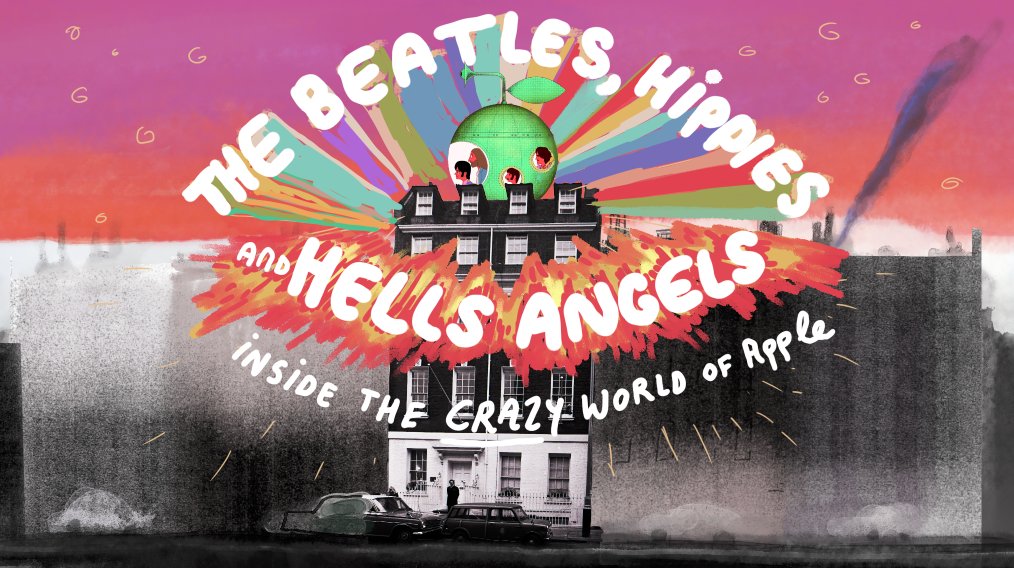
Production company Nerd TV
Commissioners James Quinn; Bill Hobbins
Length 1 x 90 minutes
TX 9pm, 17 June, Sky Atlantic
Executive producer Jago Lee
Director Ben Lewis
Producer Tom Jenner
Assistant producer Gurbir Dillon
Animator Fons Schiedon
Composer Adem Ilhan
Editor Claire Guillon

No hay comentarios:
Publicar un comentario